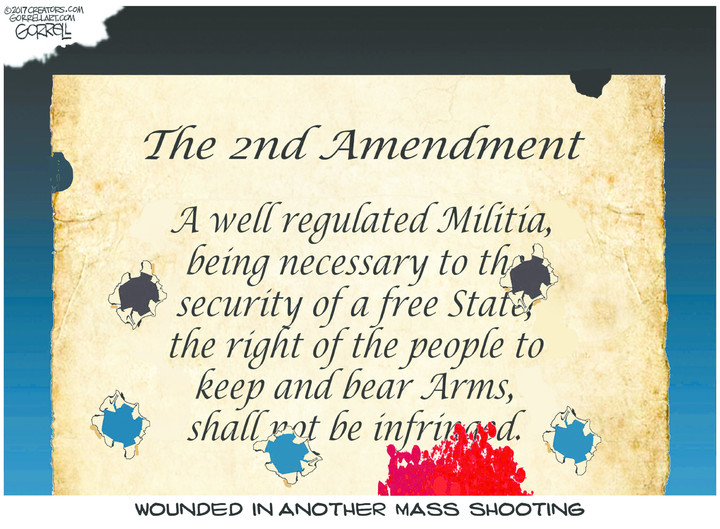
Among the many problems with the Great Gun Debate these days is that the pro-gun crowd wants to make it a culture-war battle and the anti-gun crowd wants to pretend that it isn't.
On public policy grounds, the pro-gun people have the better arguments. Firearm homicides have declined since the 1990s despite the loosening of gun laws.
Almost none of the remedies proposed in the wake of mass shootings would have actually prevented those crimes (though had so-called bump stocks been banned -- as they should be -- fewer would have died in the
Indeed, it's common in the aftermath of shootings to hear pundits and politicians call for the passage of laws that already exist. I've lost count of the number of times people have insisted that "machine guns" be banned -- they essentially already are. Others talk about banning "assault weapons" as if such a designation describes a specific kind of weapon. It doesn't. Nor would banning assault weapons, however defined, put much of a dent in the problem. Rifles of all kinds account for just 3 percent of the murder rate.
The slaughter at a
More broadly,
Indeed, the main reason for inaction isn't the "stranglehold" of the
These facts probably help explain why the
Meanwhile, anti-gun campaigners cling to the belief that they are a cadre of dedicated pragmatists who merely seek sensible gun-control laws. No doubt there are some who fit this description. But given how the most vocal advocates of gun control tend to get basic facts wrong and have a history of praising countries such as
In 2015, the New York Times ran its first front-page editorial in 95 years to call for, in part, the confiscation of millions of guns. Last month, columnist
The simple fact is that many elites in places such as
It's a useful thought experiment to ask what America would look like if the gun controllers started to rack up policy victories, confiscating guns from law-abiding gun owners. Aside from the massive financial windfall for the
Perhaps there would be fewer mass murders and other gun deaths -- though I'm skeptical. I'm sure our politics would be far uglier than they already are.
Comment by clicking here.
Jonah Goldberg is a fellow at the American Enterprise Institute and editor-at-large of National Review Online.


 Contact The Editor
Contact The Editor
 Articles By This Author
Articles By This Author